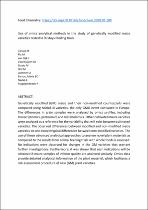 ResearchSpace
ResearchSpace
Use of omics analytical methods in the study of genetically modified maize varieties tested in 90 days feeding trials
JavaScript is disabled for your browser. Some features of this site may not work without it.
- ResearchSpace
- →
- Research Publications/Outputs
- →
- Journal Articles
- →
- View Item
| dc.contributor.author |
Corujo, M

|
|
| dc.contributor.author |
Pla, M

|
|
| dc.contributor.author |
van Dijk, J

|
|
| dc.contributor.author |
Voorhuijzen, M

|
|
| dc.contributor.author |
Staats, M

|
|
| dc.contributor.author |
Barros, Maria EC

|
|
| dc.date.accessioned | 2018-09-06T13:06:37Z | |
| dc.date.available | 2018-09-06T13:06:37Z | |
| dc.date.issued | 2018-05 | |
| dc.identifier.citation | Corujo, M. et al. 2018. Use of omics analytical methods in the study of genetically modified maize varieties tested in 90 days feeding trials. Food Chemistry: https://doi.org/10.1016/j.foodchem.2018.05.109 | en_US |
| dc.identifier.issn | 0308-8146 | |
| dc.identifier.issn | 1873-7072 | |
| dc.identifier.uri | https://doi.org/10.1016/j.foodchem.2018.05.109 | |
| dc.identifier.uri | https://www.sciencedirect.com/science/article/pii/S0308814618309300 | |
| dc.identifier.uri | http://hdl.handle.net/10204/10399 | |
| dc.description | Copyright: 2018 Elsevier. Due to copyright restrictions, the attached PDF file only contains the abstract of the full text item. For access to the full text item, please consult the publisher's website. | en_US |
| dc.description.abstract | Genetically modified (GM) maize and their non-modified counterparts were compared using MON810 varieties, the only GMO event cultivated in Europe. The differences in grain samples were analysed by omics profiles, including transcriptomics, proteomics and metabolomics. Other cultivated maize varieties were analysed as a reference for the variability that will exist between cultivated varieties. The observed differences between modified and non-modified maize varieties do not exceed typical differences between non-modified varieties. The use of these advanced analytical approaches to analyse novel plant materials as compared to the results from animal feeding trials with whole foods is assessed. No indications were observed for changes in the GM varieties that warrant further investigations. Furthermore, it was shown that such indications will be obtained if maize samples of inferior quality are analysed similarly. Omics data provide detailed analytical information of the plant material, which facilitates a risk assessment procedure of new (GM) plant varieties. | en_US |
| dc.language.iso | en | en_US |
| dc.publisher | Elsevier | en_US |
| dc.relation.ispartofseries | Worklist;21258 | |
| dc.subject | Genetically modified organism | en_US |
| dc.subject | GMO | en_US |
| dc.subject | Metabolomic | en_US |
| dc.subject | One-class model | en_US |
| dc.subject | Risk assessment | en_US |
| dc.subject | Transcriptomics Proteomics | en_US |
| dc.title | Use of omics analytical methods in the study of genetically modified maize varieties tested in 90 days feeding trials | en_US |
| dc.type | Article | en_US |
| dc.identifier.apacitation | Corujo, M., Pla, M., van Dijk, J., Voorhuijzen, M., Staats, M., & Barros, M. E. (2018). Use of omics analytical methods in the study of genetically modified maize varieties tested in 90 days feeding trials. http://hdl.handle.net/10204/10399 | en_ZA |
| dc.identifier.chicagocitation | Corujo, M, M Pla, J van Dijk, M Voorhuijzen, M Staats, and Maria EC Barros "Use of omics analytical methods in the study of genetically modified maize varieties tested in 90 days feeding trials." (2018) http://hdl.handle.net/10204/10399 | en_ZA |
| dc.identifier.vancouvercitation | Corujo M, Pla M, van Dijk J, Voorhuijzen M, Staats M, Barros ME. Use of omics analytical methods in the study of genetically modified maize varieties tested in 90 days feeding trials. 2018; http://hdl.handle.net/10204/10399. | en_ZA |
| dc.identifier.ris | TY - Article AU - Corujo, M AU - Pla, M AU - van Dijk, J AU - Voorhuijzen, M AU - Staats, M AU - Barros, Maria EC AB - Genetically modified (GM) maize and their non-modified counterparts were compared using MON810 varieties, the only GMO event cultivated in Europe. The differences in grain samples were analysed by omics profiles, including transcriptomics, proteomics and metabolomics. Other cultivated maize varieties were analysed as a reference for the variability that will exist between cultivated varieties. The observed differences between modified and non-modified maize varieties do not exceed typical differences between non-modified varieties. The use of these advanced analytical approaches to analyse novel plant materials as compared to the results from animal feeding trials with whole foods is assessed. No indications were observed for changes in the GM varieties that warrant further investigations. Furthermore, it was shown that such indications will be obtained if maize samples of inferior quality are analysed similarly. Omics data provide detailed analytical information of the plant material, which facilitates a risk assessment procedure of new (GM) plant varieties. DA - 2018-05 DB - ResearchSpace DP - CSIR KW - Genetically modified organism KW - GMO KW - Metabolomic KW - One-class model KW - Risk assessment KW - Transcriptomics Proteomics LK - https://researchspace.csir.co.za PY - 2018 SM - 0308-8146 SM - 1873-7072 T1 - Use of omics analytical methods in the study of genetically modified maize varieties tested in 90 days feeding trials TI - Use of omics analytical methods in the study of genetically modified maize varieties tested in 90 days feeding trials UR - http://hdl.handle.net/10204/10399 ER - | en_ZA |





